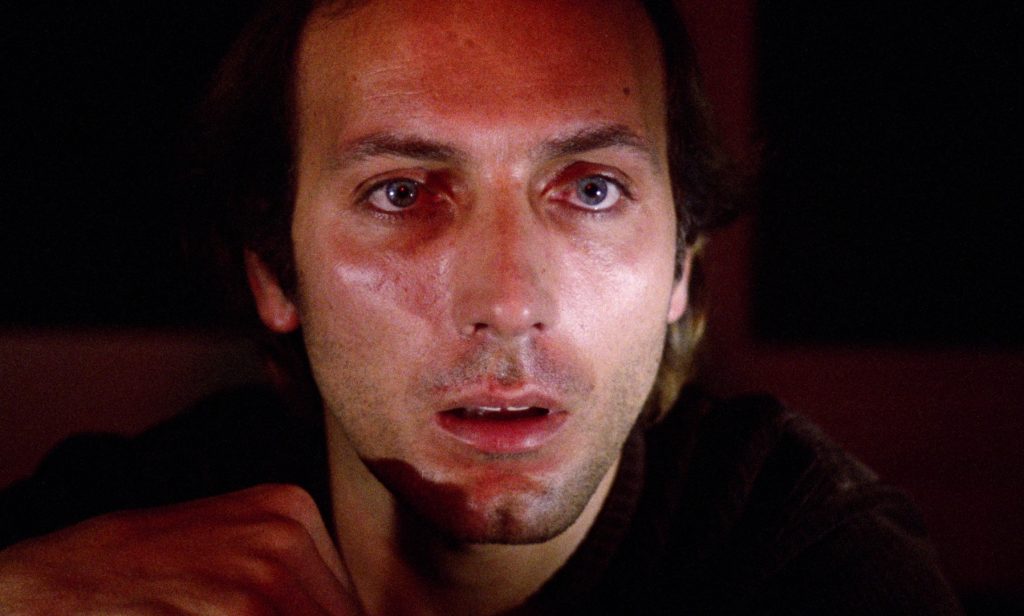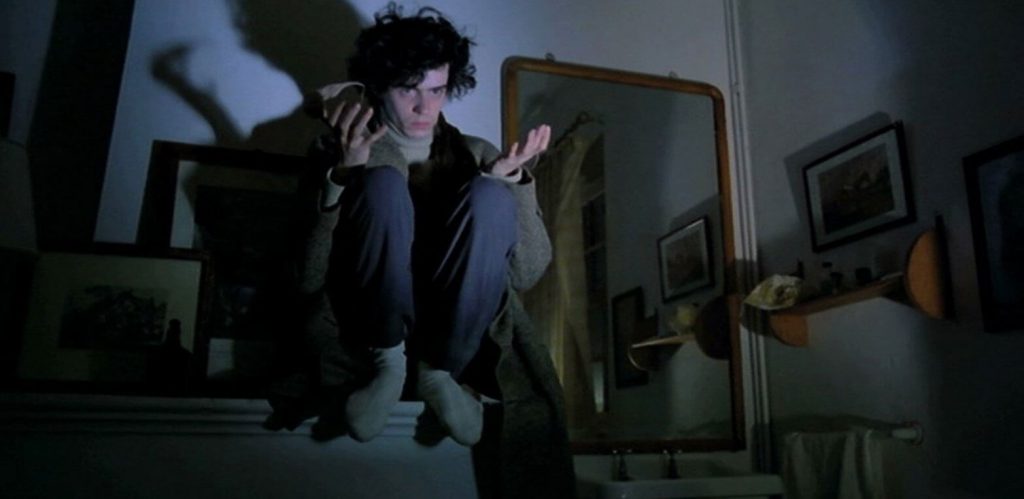Early on in Arrebato, we watch a scene, played in reverse, from one of several films within the film, of a female vampire emerging from a flaming coffin. The footage itself is evidently schlocky, but it conveys a heavy sense of foreboding that will come to make sense later on – for what follows is a vampire story of a very different sort, one in which the bloodsucking monster at its center is celluloid itself.
Released in Spain in 1979, Arrebato is the second (of two) feature length film from the late Iván Zulueta. Aside from Arrebato, Zulueta is best remembered for his work in Spanish television and as a graphic designer. He designed the posters for a couple of Pedro Almodóvar’s earliest movies, and it was the latter’s championing of and involvement in Arrebato (he hilariously provides dubbing for a supporting female character) that’s helped the film maintain a cult status within its native country, even as it’s remained mostly obscure in America. But now that’s set to change, thanks to a brand new 4k transfer, Blu-ray, streaming and limited theatrical rerelease courtesy of Altered Innocence/Anus Films.
Arrebato is one in a long line of films about characters crossing from one plane of existence to another by way of a celluloid (think Young Sherlock, Persona, The Purple Rose of Cairo, Videodrome, and, why not, Last Action Hero), as well as possibly the first in the subgenre of horror/psychological thrillers about characters who stumble upon mysterious films and descend into obsession and madness, although even with its vampire motif and eventual turn towards the unexplainable, it has less in common with full-on supernatural versions of this story—Ringu/The Ring, Cigarette Burns, V/H/S—than it does the more ambiguous versions, like David Cronenberg’s Videodrome, David Lynch’s Lost Highway and Michael Haneke’s Cache (we may as well throw in John Darnielle’s novel Universal Harvester).
In Madrid, movie director José Sirgado (Eusebio Poncela) is exhausted and depressed over his latest picture, a Z-grade vampire film he can’t stand. His despair is abetted by an increasingly serious addiction to heroin and cocaine, as well as prolonged breakup with girlfriend Ana (Cecilia Roth), a once promising actress now fighting her own losing battle with addiction after getting hooked on junk by José.
One night, after leaving the edit bay and cruising the boulevards of his city, where the A-list motions picture being advertised by the glitzy movie houses—Superman, Bambi, Quo Vadis—seem to mock him, José returns to his seedy apartment to find Ana passed out in his bed and a mysterious package waiting for him. The package contains a reel of film, as well as an audio cassette tape, from Pedro (Will More), the cousin of an ex-girlfriend with whom he shared a strange bond several years back.

Pedro is a beautiful but abrasive wastrel stuck in arrested development. He spends his days making time-lapse recordings of his surroundings on his cherished Super 8 camera, searching for footage that will give him a sense of “arrebato” (rapture). Despite his antisocial nature, Pedro and José find themselves drawn to one another over their shared love of cinema, as well a taste for narcotic powders and an obvious homoerotic attraction (José is ostensibly straight, whereas Pedro is openly bisexual). But José’s interest in Pedro goes beyond kinship and lust, the latter seeming to hold some magical abilities that are never explained (for example, he is able to conjure both José and Ana’s favorite childhood toys seemingly at will).
It’s been a couple of years since the two have last seen each other, and at first, Pedro’s film seems to be a simple diary of those years, a chronicle of his descent into debauchery and addiction (he provides raspy narration via the cassette tape). However, a more overtly sinister presence announces itself by way of Pedro’s camera, which he claims attained some kind of sentience and has been filming him as he sleeps. As if this weren’t strange enough, the footage, once developed, is blighted by red frames, moments in which time itself seems to disappear into some kind of void. These red frames increase every time Pedro develops a new reel, and so too does the sense of arrebato he feels upon waking, even as his mind and body are clearly wasting away (the physical effects resembling those of heroin withdrawal). As he watches the footage, the mystery of the red frames hooks José, leading him down the same path of horror and wonder that has swallowed up his friend.
Over the years, Arrebato has brooked inevitable comparisons to other films, particularly the aforementioned Videodrome (a screening I recently attended had them playing on a double bill). This is understandable given the way their plots and themes cross over (it helps too that Poncela has a very Spanish James Woods vibe, even if he more closely resembles actor William Fitchner). But this comparison is somewhat misleading. For as original and graphically singular a film as it is, VIdeodrome is still a pretty straightforward work of sci-fi/horror, while Arrebato is something a bit harder to define. It feels closer to the deeply unnerving, exhaustingly decadent psychodramas of Nicholas Roeg (Performance, Bad Timing, Insignificance) and Leos Carax (particularly Pola X), as well as the transgressive melodrama of—who else?—Pedro Almodóvar. In terms of Cronenberg, Arrebato is tonally more akin to Dead Ringers, thanks to its slow burn examination of narcotic psychosis (a subject Zulueta knew well from first-hand experience, as a long-time heroin user himself).
But while it may not be a traditional genre film, Arrebato’s heady blend of psychotronic horror, arthouse homoeroticism, druggy chic and metatextual mindfuck make it a must-watch for the midnight movie set, while the way it captures the (sometimes destructive) pull of cinema and the mysterious je ne sais quoi of analog technology—entirely absent in today’s digital era—convey a sense of dark rapture worthy of its title.

